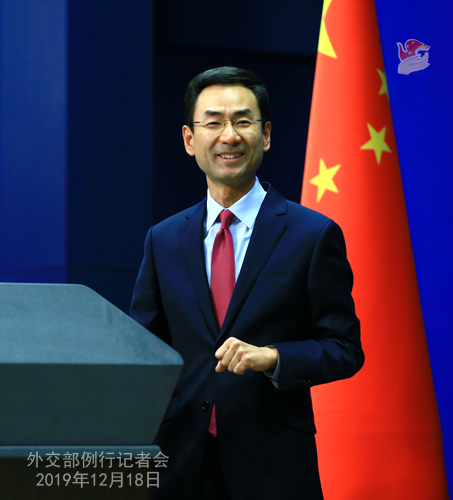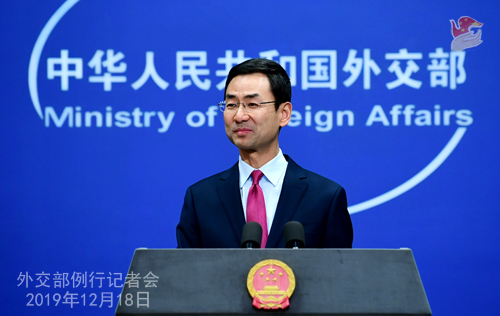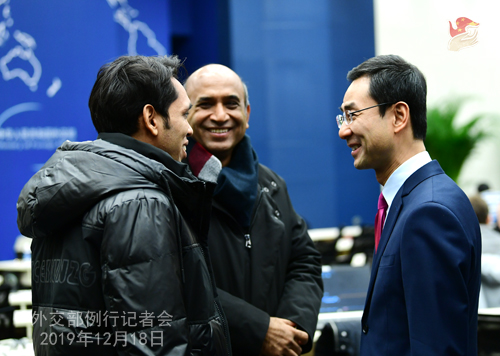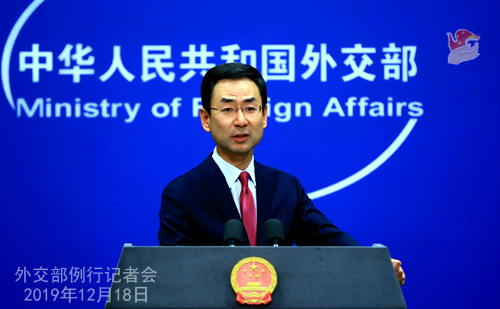| Foreign Ministry Spokesperson Geng Shuang's Regular Press Conference on December 18, 2019 |
| 2019-12-18 21:14 |
|
Q: Yesterday China and Russia proposed a draft resolution to the UN Security Council on the Korean Peninsula issue, asking for the lift of part of the sanctions on the DPRK. Also, reports say US Special Representative for North Korea Biegun will be visiting China tomorrow and the day after that. What will you discuss? A: We welcome Special Representative Biegun's visit to China on the Korean Peninsula issue. He will be meeting with Chinese officials. We will update you with more details in due course. Q: The American government, specially the Commerce Department is finalizing a set of rules that could limit exports of high-tech products to China, including tech related to quantum computing and 3D printing. What's the foreign ministry's comment on this? A: I noted media reports on that. The Chinese side firmly opposes the US over-generalizing the concept of national security, abusing export control measures, and interrupting and impeding exchange and cooperation between companies. We urge the US to enhance, instead of undermining mutual trust and collaboration between the two countries. There's something more I want to say to the US side. Don't think you can ever deter China's growth as well as scientific and technological innovation by limiting exports of high-end technologies to us. You are being too arrogant. In the past 70 years after the establishment of the PRC, all our glorious achievements were made by the independent, gritty and hard-working Chinese people with painstaking efforts. Restriction, disturbance, sabotage and blockade from the US side will not be a major problem for us. They are temporary setbacks that will only make us more intelligent and ambitious. We have full confidence in the future of China's science, technology, growth and strength.
Q: State Councilor and Foreign Minister Wang Yi just concluded his trip to the European Union, which was also his second visit to Brussels this year as head of the Chinese delegation. How do you view his visit and the future of China-EU relations? A: This year has been a productive year for China-EU relations. It was not long before State Councilor Wang Yi's visit that the new EU leadership took office. Their in-depth discussions sent a positive signal to the world of deepening China-EU comprehensive strategic partnership, jointly upholding multilateralism and international order and addressing global challenges. It demonstrates "three alwayses" in China's vision. -As always, China values Europe. China views Europe's development in a positive manner and sees it as our major cooperative partner and one of China's diplomatic priorities. We firmly support the European integration process, the unity and growth of the EU, and a bigger role for Europe to play in international affairs. Between China and Europe there are no fundamental conflicts of interests. We are partners for win-win cooperation, not rivals in a zero-sum competition. As China's EU policy has been highly stable and consistent, we believe the EU institutions under the new leadership will keep to EU's China policy that is consistent and forward-looking, and continue to advance China-EU relations. -As always, China is determined to boost China-EU practical cooperation. This year we signed agreements on aviation cooperation, concluded negotiations on the Geographical Indications (GI) agreement, and made good progress in enhancing the complementarity between the Belt and Road Initiative and the EU's Strategy on Connecting Europe and Asia. Though faced with global economic downward pressure, economic and trade cooperation between China and the EU has bucked the trend and kept growing. China would like to work with the EU to enhance synergy of our respective strengths, foster partnerships for green, digital development and free trade, which will contribute to our economic growth, social development and people's wellbeing. -As always, China is committed to strengthening China-EU coordination in global affairs and safeguarding multilateralism with the EU. Facing the headwinds of protectionism and unilateralism, as two major world forces, China and the EU cannot simply stand by. We must take on our responsibility and deal with it together. We need to stay committed to multilateralism, enhance coordination and collaboration in upholding free trade, improving global governance and addressing climate change, and make the world a more stable and open place with greater positive energy. The year 2020 will mark the 45th anniversary of the establishment of diplomatic ties between China and the EU, when a series of major bilateral events will take place. China is ready to work with the EU to ensure the success of the items on our political agenda, work for more cooperation outcomes, draw a new blueprint for collaboration and take China-EU partnerships for peace, growth, reform and civilization to a new level. Q: US Senate passed the National Defense Authorization Act for Fiscal Year 2020, approving the establishment of a space force. What's your comment? A: We note reports on that. They serve to illustrate the rising risk of weaponization of outer space, which may turn it into a new theater of warfare. China is deeply concerned about that. Outer space is a shared asset of all mankind. It serves the interests and is the shared responsibility of all countries to ensure the peaceful use of the outer space and to prevent its weaponization and arms race in the outer space. Under current circumstances, there is greater relevance and urgency to initiate negotiation of a legally-binding instrument on outer space arms control. We hope the international community, certain major countries in particular, will adopt a prudent and responsible attitude to safeguard lasting peace and tranquility in outer space and make sure it will not become a new battlefield.
Q: This year has been a challenging year for China in many ways, for instance, the trade frictions with the US. And on the other hand, many would say China has made impressive progress. How would you characterize this year in terms of China's relations with the world? A: As you have been in China for a long time, you may know that at each year end we review the achievements in the past year and plan for the next one. Here's a plug for our foreign ministry. It is a tradition for State Councilor and Foreign Minister Wang Yi to do the reviewing and planning for China's diplomacy in a press interview around this time each year. Stay tuned, and I believe you will hear an authoritative answer from State Councilor Wang Yi soon. Q: I have a question following on last Friday's press conference with Chinese officials. The US has said China agreed to buy $200 billion extra in US exports in the next two years including $40 to 50 billion worth of agricultural products. China hasn't confirmed these numbers yet. Can you confirm that is part of what China and the US agreed upon? Also, when will the signing happen? Robert Lighthizer said that they are planning for January with the agreement going into effect 30 days after that. Is that your understanding of this agreement? A: Chinese officials in charge of this matter talked about that from the press on the China-US phase-one trade agreement in a press briefing held by the State Council Information Office last Friday night. They answered questions including the ones you asked, namely China's extra purchase from the US side and the timing of the signing of the phase-one trade deal. As those questions have already been answered by officials in charge, I have nothing to update you at the moment. Follow-up: I asked those questions at the press briefing and there was no answer from the officials. Do you have anything further to add this time? A: As I said, I have no updates for you at the moment. I watched that press briefing and, as I recall, our officials responded to those questions with much content. Maybe you could read the press release again. Q: With the UN Security Council sanctions on DPRK, was there a formal request for the sanctions to be lifted on the DPRK labor overseas? A: The draft resolution on the Korean Peninsula issue distributed by China and Russia at the Security Council yesterday contains three major points, one of which is to lift part of the sanctions on the DPRK. Maybe you could read that again. As I recall, it includes the content of labor.
|
|




